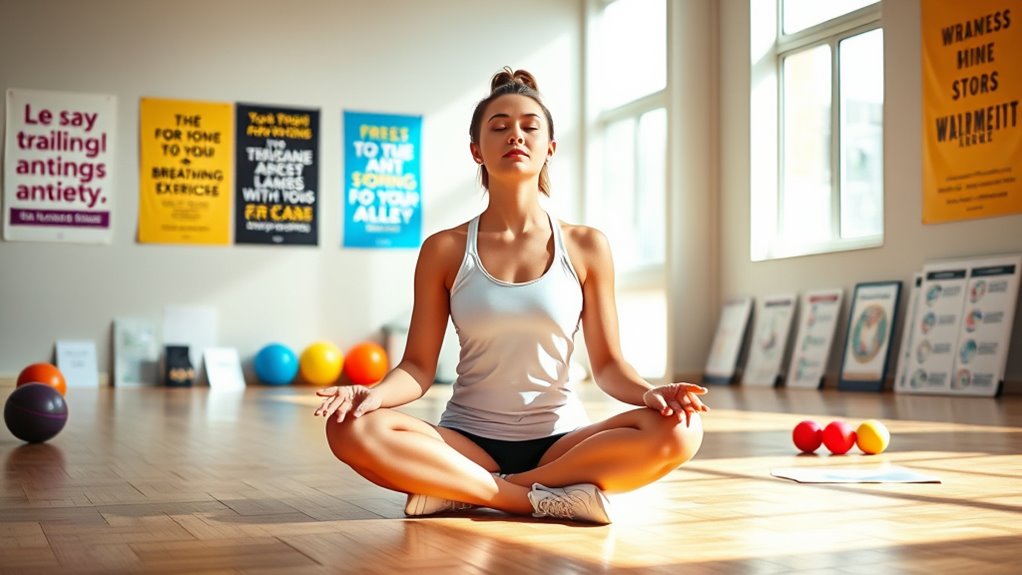Athletes use mental reps, visualization, and mindfulness to boost focus, resilience, and confidence—all skills you can apply to your daily goals. By practicing mental rehearsal regularly, you strengthen neural pathways, making responses automatic and reducing anxiety. Visualization helps you see success vividly, while mindfulness keeps you present and emotionally balanced. Incorporating these techniques into your routine boosts mental toughness and improves your ability to handle stress and setbacks. Keep exploring to learn how to make these methods work for you.
Key Takeaways
- Mental rehearsal enhances daily goal achievement by strengthening neural pathways, increasing confidence, and fostering automatic responses.
- Visualization techniques create vivid mental images that boost motivation, emotional resilience, and positive mindset shifts.
- Regular mental practice improves focus, concentration, and emotional regulation applicable to everyday challenges.
- Incorporating mindfulness helps manage stress, build resilience, and stay present in pursuing personal and professional goals.
- Consistent mental reps develop mental toughness, enabling better handling of setbacks and maintaining motivation in daily life.
Understanding the Power of Mental Rehearsal

Have you ever wondered how athletes perform their best under pressure without actually practicing every move in real life? Mental rehearsal plays a crucial role, and it begins with mindfulness training. By practicing mindfulness, you learn to stay present and centered, which enhances your emotional regulation. When you visualize yourself succeeding, you reduce anxiety and build confidence, making actual performance feel more natural. This mental practice isn’t just about imagining actions; it’s about engaging your mind as if you’re physically performing. Through consistent mental rehearsal, you strengthen neural pathways, making responses more automatic. This process helps you manage stress and stay focused, proving that mental reps are just as essential as physical ones for peak performance. Additionally, understanding the benefits of visualization can deepen your mental practice and improve your results.
How Visualization Boosts Performance

Building on the power of mental rehearsal, visualization takes this practice a step further by actively engaging your mind in imagining successful performance. When you visualize, you create vivid mental images that reinforce positive mindset shifts and strengthen emotional regulation. This process deepens your belief in your abilities and prepares you to respond calmly under pressure. To maximize benefits, focus on: 1. Creating detailed scenarios that simulate real performance conditions. 2. Practicing emotional regulation by imagining handling setbacks confidently. 3. Reinforcing mindset shifts that foster resilience and focus. Visualization doesn’t just boost confidence; it trains your brain to stay composed, adapt, and execute with precision. By mentally rehearsing success, you prime yourself for actual achievement, turning imagined victories into real ones. Incorporating visualization techniques aligned with the Law of Attraction principles can amplify these mental exercises by aligning your thoughts and emotions with your goals.
Building Focus Through Mental Practice

When you engage in mental practice, you strengthen your ability to maintain unwavering focus during competition. Techniques like mindfulness meditation help you stay present, sharpening your attention on the task at hand. By practicing mindfulness regularly, you train your mind to filter out distractions and stay centered. Additionally, effective goal setting directs your mental energy towards specific objectives, enhancing concentration. Visualize your goals clearly and break them into manageable steps, reinforcing your focus each time you practice mentally. These strategies improve your mental clarity, allowing you to stay calm and composed under pressure. Consistent mental practice creates a habit of sustained focus, which translates beyond sports to everyday tasks and challenges. Over time, you’ll find it easier to concentrate deeply and maintain attention where it matters most. Incorporating AI security technologies into your routines can help protect your mental data and optimize your focus strategies.
Developing Resilience With Mental Toughness Exercises

Developing resilience is essential for athletes facing setbacks and intense pressure, and mental toughness exercises are key to strengthening this quality. To build resilience, focus on these strategies:
Building resilience boosts your mental toughness and helps you bounce back stronger from setbacks.
- Practice mindfulness training daily to stay present and reduce emotional reactivity during challenges.
- Use emotional regulation techniques, like deep breathing or visualization, to manage stress effectively.
- Set small, achievable goals that encourage consistent progress, reinforcing mental toughness over time.
- Incorporate resilience-building activities such as challenging outdoor exercises or scenario simulations to simulate real-life stressors and enhance mental strength.
These exercises help you develop a resilient mindset, enabling you to bounce back faster from setbacks. By integrating mindfulness training and emotional regulation into your routine, you strengthen your mental reps, making you more adaptable and focused under pressure. Resilience isn’t just about toughness; it’s about smart, mindful responses to adversity.
Applying Mental Reps to Career Goals

You can use mental reps to stay focused on your career goals by visualizing success regularly. Practicing mental rehearsals helps you prepare for upcoming challenges and improve your performance. Incorporating these techniques keeps your mindset sharp and goals within reach. Additionally, understanding resources and tools available can further enhance your ability to stay motivated and strategic in achieving your objectives.
Visualize Success Regularly
Regularly visualizing success can substantially boost your confidence and focus, making your career goals feel more attainable. To do this effectively, incorporate these steps:
- Practice mindfulness training to stay present and deepen your mental imagery, enhancing emotional regulation.
- Create vivid mental pictures of achieving milestones, engaging all your senses to make the visualization more powerful.
- Repeat your success scenarios daily, reinforcing positive beliefs and reducing anxiety about challenges.
- Incorporate mental health solutions such as relaxation techniques to maintain emotional well-being during your visualization practices.
Practice Mental Rehearsals
Practicing mental rehearsals allows you to prepare for real-world challenges by simulating key scenarios in your mind. By visualizing yourself managing difficult conversations or high-pressure meetings, you build confidence and resilience. Incorporate mindfulness meditation into your routine to stay present during these practice sessions, helping you manage emotional regulation. This calm awareness enables you to respond thoughtfully rather than react impulsively. Repeating these mental reps strengthens your ability to stay focused and composed under stress, making the progression to actual situations smoother. Over time, you’ll develop a mental toolkit that boosts your performance and emotional control, empowering you to handle career hurdles with clarity and confidence. Consistent mental rehearsal is a powerful way to turn envisioned success into real achievement.
Overcoming Anxiety and Stress Using Mental Techniques

Have you ever felt your heart race or your mind spiral just before a big competition? If so, mental techniques can help you overcome anxiety and stress. Here are three strategies to try:
- Practice mindfulness meditation daily to center your thoughts and stay present, reducing racing mind and worry.
- Use deep breathing exercises to calm your nervous system and improve emotional regulation during high-stress moments.
- Visualize successful outcomes to build confidence and reframe negative thoughts.
- Being aware of side effects of juice detox, such as fatigue or dizziness, can help you better manage stress and maintain focus during challenging moments.
These techniques strengthen your mental reps, helping you manage anxiety effectively. When you incorporate mindfulness meditation and emotional regulation skills into your routine, you’ll feel more in control and ready to perform at your best, even under pressure.
Creating a Personal Mental Practice Routine

To build an effective mental practice routine, you need to set aside regular time each day to focus on your mental reps. During these sessions, visualize your success with clarity and detail to reinforce your confidence. Consistency and vivid imagery help make mental training a powerful part of your overall athletic preparation. Incorporating mindfulness techniques, such as unplugging from technology, can further enhance your focus and presence during practice.
Establish Consistent Sessions
Establishing a consistent mental practice routine requires committing to regular sessions that become a non-negotiable part of your training schedule. This consistency builds mental resilience and sharpens focus. To stay on track: 1. Schedule specific times for mindfulness training each day, making it a habit rather than an option. 2. Use goal setting strategies to define clear, achievable objectives for each session, maintaining motivation. 3. Keep sessions short but focused, gradually increasing duration as you gain confidence and skill. Additionally, incorporating consistent routines can help reinforce the habit and ensure sustained progress.
Visualize Success Clearly
Creating a personal mental practice routine begins with developing a vivid and detailed mental image of success. In sports psychology, imagery techniques help you picture your goals clearly, enhancing confidence and focus. To do this, engage all your senses—visualize every detail of your achievement, from sights and sounds to feelings and sensations. The more realistic your mental picture, the more effective your mental reps become. Use consistent practice to strengthen this mental image, making it easier to access during real situations. Remember, the goal is to create an unmistakable, compelling image of success that drives your motivation. Incorporating visualization techniques can deepen the impact of your mental practice, making success feel more attainable and natural. By mastering imagery techniques, you’ll train your mind as diligently as your body, making success feel more attainable and natural.
The Science Behind Mental Rehearsal and Success

When you mentally rehearse a skill, your brain activates many of the same neural pathways used during actual performance, which can substantially boost your chances of success. This process leverages brain plasticity, allowing your brain to strengthen connections and improve skill retention. Additionally, mental rehearsal influences your subconscious mind, subtly shaping your confidence and focus. Here are three key insights:
Mental rehearsal activates neural pathways, boosts confidence, and accelerates skill mastery through brain plasticity.
- Mental practice enhances neural efficiency, making physical execution smoother.
- Repeating visualizations rewires brain circuits, solidifying skills faster.
- Subconscious influence from mental reps boosts motivation and reduces performance anxiety.
Practical Tips for Incorporating Mental Reps Into Daily Life

To effectively incorporate mental reps into your daily routine, start by setting aside a few minutes each day for focused visualization. Use this time to imagine successful outcomes, strengthening neural pathways. Incorporate mindfulness training to stay present and aware of your emotions, enhancing emotional regulation during challenging moments. Consistency is key—practice daily, even if just for a few minutes. You can create a simple routine, like deep breathing followed by visualization. Here’s an example to guide you:
| Step | Focus Area | Technique |
|---|---|---|
| 1 | Mindfulness | Brief meditation or breath awareness |
| 2 | Visualization | Picture achieving your goal |
| 3 | Emotional Regulation | Acknowledge and manage feelings |
This routine fosters mental resilience, helping you stay focused and composed in everyday situations.
Frequently Asked Questions
How Long Should Mental Rehearsal Sessions Ideally Last?
When it comes to mental rehearsal, you should focus on ideal mental duration and visualization timing. Ideally, sessions last around 10 to 15 minutes, allowing you to stay focused without fatigue. Keep your visualization sharp and vivid, practicing regularly throughout the day. Short, consistent sessions are more effective than long, infrequent ones, helping you build mental reps that enhance your real-world performance and goal achievement.
Can Mental Reps Replace Physical Practice Entirely?
Sure, mental reps can replace physical practice—said no athlete ever. Imagery effectiveness is powerful, but it can’t beat the real deal. Relying solely on mental rehearsal risks mental fatigue and diminishing returns. You need physical practice to build muscle memory and confidence. So, while mental reps are a helpful supplement, they’re no substitute for the sweat, effort, and real-world experience that truly make you better.
What Are Common Mistakes to Avoid in Mental Visualization?
When practicing mental visualization, you should watch out for common mistakes like falling into visualization pitfalls, where you focus only on positive outcomes and ignore challenges. Avoid mental complacency by not regularly updating your imagery or making it too automatic. Instead, stay engaged, visualize detailed scenarios, and incorporate obstacles you might face. This keeps your mind sharp and prepares you better, preventing the trap of complacency that hinders growth.
How Do Mental Reps Differ Across Various Sports?
You’ll find that mental reps differ across sports because each requires unique visualization consistency and sport-specific imagery. For example, a golfer visualizes smooth swings and focus, while a gymnast emphasizes precise movements and balance. By tailoring mental reps to your sport’s demands, you strengthen your mental game, enhance performance, and build confidence. Keep practicing sport-specific imagery regularly to develop sharper mental reps, just like physical training.
Are There Age-Specific Mental Training Techniques for Beginners?
Imagine starting fresh with big dreams, yet feeling overwhelmed—age considerations matter. For beginners, age-specific mental training techniques can boost confidence and focus. Younger learners benefit from playful visualization, while older beginners thrive with mindfulness and goal-setting. No matter your age, these tailored techniques help you build mental reps, making your goals feel more achievable. Embrace your stage in life, and use the right mental strategies to succeed.
Conclusion
By embracing mental reps, you unseal a secret weapon—your mind’s power to shape your reality. Just as athletes visualize victory, you can turn your dreams into achievable goals through simple mental practices. Remember, your mind is the coach guiding you through every challenge. So, why not harness this mental magic daily? With consistent effort, you’ll find yourself not just chasing success, but catching it—one focused thought at a time.









